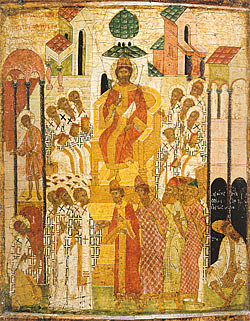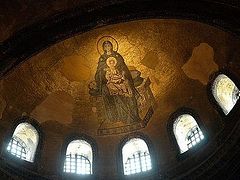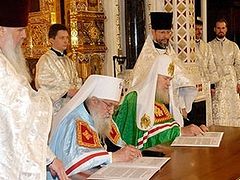 First Ecumenical Counsil
First Ecumenical Counsil We know that in modern biology, a living organism is a complex system of information requiring cooperation of all its parts. Disease, be it physical or mental, disrupts this unity. The body, being dynamic, naturally works with diverse influences that may appear to be contrary. In mental life we often have contrary desires or thoughts. When this happens we may even have a personal crisis. If one works through it well, one will come up with a different way of thinking or behaving, many times for the better. If the crisis cannot be resolved in a creative and healthy way, a person may end up broken, sometimes for life.
Using this metaphor, one can see the Church in the same way. God created people with different skills and talents (1 Corinthians 12:4). We know from the Gospel that we are to use our talents and not hide them out of fear (Matthew 25). Our Lord says that at least we should invest them (ibid. v.27). In practice, this means that the Church inherently will have some division. When conflict is from Heaven, so to speak, we see contrary views leading to a greater unity and understanding. An example of this is the debate over circumcision and all it implied in the early Church. SS Peter and Paul represented the two sides. The conflict led to unity and to the practice of a conciliar Church.(Acts 15).
Conflicts born of the Devil are ones when pride, the greatest sin, takes hold like a cancer and infects the Church. Division is the result. Examples of this are too numerous to count. Look into the phone book and see how many Christian denominations there are. There are actually many more than are listed. The diversity of churches is a sign of historical fights that lead to division upon division. The Arian controversy led to two different types of Christianity and divided a Christian empire. Division of this sort comes in two major forms, heresy and schism.
St Basil tell us that heresy (from the Greek verb to choose) is a conflict that can not be resolved, e.g. the Orthodox view that the Son is not created and the Arian that He is. Heresy leads to permanent division.
Schism on the other hand is a break in church discipline that can theoretically be reconciled, i.e. the division over the calendar. A council could resolve the issue (Cf. St Basil, Letter to Amphilochius).
* * * * *
A year ago our Russian Orthodox Church Abroad reunited with the Moscow Patriarchate. As is well known, some were unable to accept this and left the Church Abroad. Some went gone off to other canonical churches. Others left to create yet another jurisdiction. They called us and continue to call us schismatics, heretics or any other list of insults. From a historical and psychological viewpoint, this is business as usual. I wish to outline some of the spiritual and psychological aspects of the schismatic mind set. Using a disease model I will treat the schismatic mind set like a disease, with an etiology, symptoms and prognosis.
In my work with people I often find that the purpose of a psychological disturbance comes down ultimately to be a way of perpetuating a belief, feeling or behavior that a person has become attached to. The goal of repeating certain behaviors is to perpetuate the behaviors and their corresponding feelings. People do this to identify themselves with certain beliefs, feeling and behaviors and use them to fend off unwanted beliefs and feelings. The ultimate goal of the schismatic is to be a schismatic. He will deny this because of his need to see himself as pure, or at least striving for purity. This mindset seeks exclusive, elite movements to provide a sense of security and as a means to assuage any feelings of guilt and shame. This mindset is common in all religions and in many secular movements, especially political ones. Communism and fascism are examples of political cults that function in many ways like religion. Thus a Christian and a Communist can share the same propensity for ideological purity.
The etiology, i.e. cause, of this disorder is usually a profound sense of shame and a need to have some verification that is tangible that they are good or at least saved. Christianity has a long history of people seeking a more profound commitment to God than what the common person appears to have. When based upon shame, the person tends to separate himself and seek others with the same mindset.
Fr Ronald Knox, in his book "Enthusiasm," has pointed out some tendencies that define the mindset. Many schismatics seek to live a less worldly life than their neighbors. They take seriously St Paul’s dictum “come out from among them and be ye separate” (2 Corinthians 6:17). They also seek to be more attentive to the power of the Holy Spirit and look for spiritual experiences or verification of holiness. They separate themselves from their coreligionists, whom they see as lazy, deluded or less spiritual than they.
In the early Church, many fervent people sought martyrdom. Later many became monastics. Many others, seeking a greater purity of faith, left the Church to join groups they perceived as more authentic. True to human nature, the Christians who belonged to the ‘established Church” began to antagonize these people with cheap jokes, ridicule or repression. Usually the provocation is mutual. The schismatic takes a victim stance and sees himself as persecuted and will begin to speak of martyrdom.
Once one becomes a “victim” in one’s mind, he will begin to justify his behaviors. The schismatic will begin to talk about new wine in old wine skins, etc. Schismatics will look for slights and provocation to justify separation. They see others as false Christians. Sometimes they push societal rules and the “established church” takes legal action. This means that many of the established churchmen join forces with secular forces against the schismatics. To the schismatic this is proof that the established church is corrupt or in league with the Devil.
Christian schismatics many times justify their behavior as a return to the dynamics of the early Church, a time that was dynamic and exciting. They will want to keep up a sense of excitement that comes with a new movement. Excitement can give one an inflated sense of self importance and power. For many, it is an experience of being fully alive. But as the movement begins to grow there comes a time when it must organize or die. The organization many times is experienced as establishing an organized church. Several things can happen at this time. The follower may feel that the institutionalization of the movement is a sign of treason. The schismatic may want to separate from the movement to start again something new and exciting. Another dynamic is that the schismatic may see the movement filled with traitors. Schismatics begin to feed off each other. There will be heresy hunts and accusations aplenty. Many people will be expelled, shunned and at times in history, even killed. Look at the Russian Revolution: Lenin and Stalin committed many atrocities against fellow communists. (As said earlier, this phenomenon is not restricted to religious people.) The Protestant reformers persecuted fellow Protestants, even though an aspect of Protestant theology is that each person has the right to their own interpretation of the Scriptures. Above all, the schismatic want to belong to an elite organization that is pure, untainted and offers quick and simple solutions to the ambiguities of life and faith.
The aforementioned Fr Knox calls this mindset: ultrasupernaturalism. This is a belief that one is to expect definite and concrete signs of God’s grace. This view is evidenced by three characteristics:
1. Extreme standards of perfection. The saints are not seen as spiritual athletes, an exception, but are the norm of the Christian life by which everyone is judged. This is held especially against those who belong outside the group. Despite protestations that he is just a sinner and does not judge, the schismatic will judge everyone by these standards. This is born out of a narcissistic need to be seen as perfect. The narcissist wants either to be admired or will bask in the glow of another. In the Orthodox Church, many will tend to put on the cloak of false humility and then brag about their starets or bishop. They will speak of a long line of saints in their spiritual ancestry. This is done to bolster their own pride and to justify their actions. The purpose is ultimately to make themselves feel righteous and others feel shame.
2. Rigidity concerning rules, especially regarding repentance. This follows from the first. Many schismatic will believe that those who oppose must repent of their errors. The standards of repentance are so rigid that it would be nearly impossible to achieve. Many believe that the bishops of the Russian Church were collaborators, ecumenists or outright communists. They demand repentance. The fact that many have repented is irrelevant because they did not do a good enough job to satisfy the schismatic. The schismatic lacks empathy and understanding about the ambiguities of life. The Church to them is not about bringing sinners to repentance but rather it is an ideologically pure organization that demands perfection. If they accepted the faults of others then they could not justify leaving. This sets up criterion number three:
3. Exclusivity. The schismatic will have no halfway Christians. Christianity is only for the pure. This purity is more in ideological correctness or a rigid adherence to canons. Those in the group who do not live up to the letter are made to feel shame and guilt. This can be done in a variety of ways. I recommend that people read Margaret Singer’s Cults in Our Midst to gain a greater understanding of the techniques used. These groups tend to be authoritarian, exclusive and develop a double set of ethics. The latter is called antinomianism.
The exclusivity has already been mentioned. These groups tend to be centered around a charismatic leader, who is seen as very spiritual. Sometimes the leader holds great power over everyone. Other times the leader is a distant figure head symbolizing the movement. In the latter case everyone in the group has greater responsibility in maintaining the purity of belief. More often than not there will be a small number of people who use the leader and they themselves are the true authorities. Either way, the average follower is under scrutiny to keep up the appearances of perfection.
All this gives the schismatic a sense that he belongs to a different and superior society. The rules of the group are more important than that of the greater society. This gives the schismatics a sense of superiority and entitlement. Worldly society has no real authority over them and sinful people have no real rights. They may obey civil laws begrudgingly to avoid prison. Many begin to talk about belonging spiritually to theocracies and ideal governments that do not exist. The realpolitik of political life is scorned. Some will even begin to develop their own communities.
The schismatic, suffering from a sense of superiority, entitlement and exclusion, begins to see his group as an island haven in a sea of sin and hostility. The overwhelming sense of hostility will lead to the group developing paranoia. These groups become suspicious of others. People in the group begin to doubt the loyalty and fidelity of others. They speak little of their internal conflicts. The group image of perfection is upheld at all costs. When this occurs, the Christian schismatic become apocalyptic.
People begin to talk more about the Devil and the Antichrist ruling the world. This way of thinking only increases the schismatic’s justification for his behavior. There becomes an increasing belief that the end is near. Talk in the community will be about how God will only save the faithful remnant. Now an interesting phenomenon occurs. The superior people, especially the leaders, begin to fall into antinomian behaviors. Antinomianism means against or opposed to the law.
Through out history exclusive apocalyptic movements end up justifying immoral behaviors for themselves. The most common sins involve money and sex. It is not uncommon for the leader or leaders to exploit members for money and sex. Notice the number of money and sex scandals that are involved in these groups. Of course, these scandals happen everywhere but the schismatic will justify the behavior or claim persecution. They will make themselves out to be martyrs.
St John of Damascus, in his Font of Knowledge, identifies a number of heretical and schismatic groups of his time. They vast majority of these groups ended with the rise of Islam. Most groups either die out or become institutions, e.g. the Mormons. These groups end up having their own schismatics. Thus the perpetual cycle of people needing a perfect organization in an imperfect world continues. These people are vulnerable for the ever-present criminal or psychopath to exploit them. Living by faith takes courage. Faith is the substance of things hoped for, the assurance of things unseen. (Hebrews 11:1.) It is difficult to trust in what is unseen. We see through a glass darkly (1 Corinthians 13:12), as St Paul says. Many hope that by will-power they can at least lighten the tint.
Church of All Saints of Russia
Denver, Colorado



